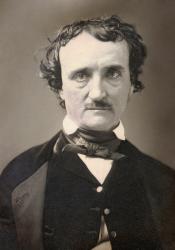Edgar Allen Poe's “The Importance of the Single Effect in a Prose Tale" (1842)
Edgar Allen Poe, in his essay "The Importance of the Single Effect in a Prose Tale," reviews Hawthorne's short story collection Twice-Told Tales (vol. 1 1837, vol. 2 1842). In the published essay, Poe outlines successful aims of a skilled literary artist: "If wise, he has not fashioned his thoughts to accommodate his incidents; but having conceived, with deliberate care, a certain unique or single effect to be wrought out [...]." Poe argues the short story is the highest literary form. In comparison, the novel violates an important structural feature: "In the whole composition there should be no word written, of which the tendency, direct or indirect, is not to the one pre-established design." Poe highlights the importance of every single word functioning in service of the “pre-established design.”
Poe stresses the importance of a single effect, which Dan Shen analyzes in his article, “Edgar Allan Poe's Aesthetic Theory, the Insanity Debate, and the Ethically Oriented Dynamics of ‘‘The Tell-Tale Heart,’’”: “If some of Poe’s tales convey a moral, then that moral tends to be implicit and inseparable from the structural ‘unity of effect’” (322). Even within this structural “unity of effect,” Poe’s tales do not ignore their cultural context, as it reveals Gothic anxieties surrounding sanity, the supernatural and individualism.
Shen, Dan. “Edgar Allan Poe's Aesthetic Theory, the Insanity Debate, and the Ethically Oriented Dynamics of ‘‘The Tell-Tale Heart.’’” Nineteenth-Century Literature, vol. 63, no. 3, 2008, pp. 321–345., doi:10.1525/ncl.2008.63.3.321.

